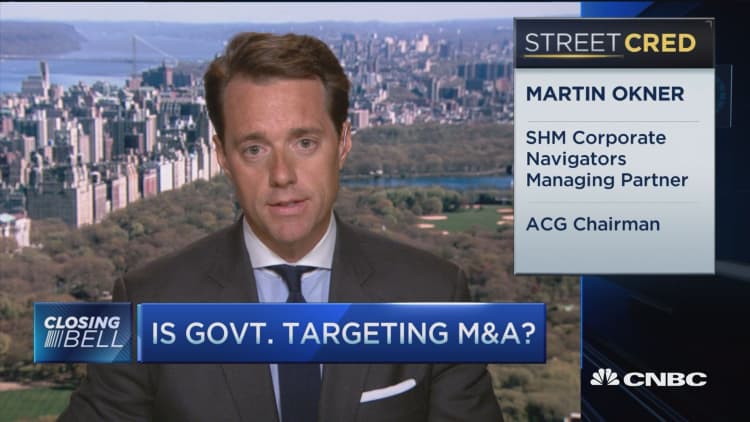
New rules by the Treasury Department to limit tax inversions drew criticism Wednesday.
"It's Congress' job to determine when and if inversions should take place," Nicholas Fortuna, founder and managing partner at Allyn & Fortuna said Wednesday on CNBC's "Closing Bell." "What the Treasury Department is doing at this point is just blocking these inversions without considering the overall economics of the deal," he noted, adding that is a "crude" and "hard approach" to deals.
Fortuna is one of many who are slamming the agency's quest to control tax inversion laws. Pharmaceutical companies Pfizer and Allergan called off a $160 billion merger on Wednesday after the Treasury unveiled new rules Monday that challenged the deal.
Separately, the Department of Justice filed a law suit Wednesday against Halliburton's efforts to acquire oil field services company Baker Hughes.
Allergan's CEO joined CNBC on Wednesday and said that it appears that the U.S. government targeted the merger.
"We built this deal around the law, the regulations, all the notices that were put out by the Treasury," Brent Saunders said on "Squawk on the Street," noting that last-minute changes to regulations are "un-American."
"These rules, this three-year look back was designed I think very specifically to target this deal. I don't believe, based on initial review, that it impacts any other deal."
Meanwhile, Martin Okner, co-founder and managing director of SHM Corporate Navigators, argues that inversions amount to a very small percentage of mergers and acquisitions and a crackdown from the government makes a dent in M&A activity. Also, the pressuring of the sector is indicative of an unfavorable regulatory environment that's developed in the past six years, he said.
"The ripple effects that this has and the complexity that the DOJ and various regulating agencies and the federal government has placed on M&A activity with the passing of the Dodd-Frank, has had serious implications on both the cost of getting a deal done and the complexity," he said on "Closing Bell." Okner also suggests that U.S. corporate tax rates need to be reformed in order for the country to be competitive globally.
Conversely, investors are eyeing the impact that a tightly controlled M&A regulatory system holds on investments.
Allergan was downgraded from "buy" to "neutral" by Mizuho Bank as the Pfizer deal fell through. The firm cited that despite Allergan being one of the "stronger" pharma companies, it expects the consensus numbers to come down. Both companies rose Wednesday; Pfizer closed up 5 percent, while Allergan rose 3.5 percent.
Meanwhile, Okner contends that the most-affected companies in a tight regulatory environment aren't large-cap companies, but mid-cap.
"The bulk of the M&A activity in the U.S. is in the middle market," he said. "They've been faced with a huge increase in regulatory cost and that's created a serious issue with regard to the level of M&A activity."



